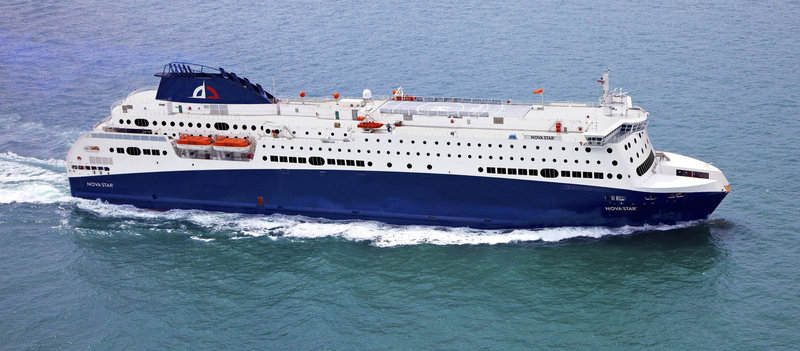One of the two companies that are proposing to operate a ferry service between Portland and Yarmouth, Nova Scotia, has secured an agreement to lease a new $165 million cruise ferry that was built to cross the English Channel.
Quest Navigation Inc. of Eliot says it can start service this summer if it’s awarded a contract by the government of Nova Scotia. The province has said it will provide as much as $21 million over seven years to subsidize ferry service, which boosts its economy.
Quest Navigation is one of two companies that submitted proposals three weeks ago.
The other, Baltimore-based Maritime Applied Physics Corp., is an engineering firm that specializes in designing electro-mechanical systems for harsh environments. It has an office in Brunswick, and its clients include Bath Iron Works.
The Nova Scotia government is expected to decide this month whether to partner with one of the companies or issue another request for bids.
Initially, advocates for the ferry service were disappointed by the bids because neither company has experience operating ferries. But both companies say they’re working with other companies that have experience.
Quest Navigation has an agreement with a Florida company to manage the ferry crews. Maritime Holdings Group provides technical services and crews for ship owners.
It now operates two ferries between Florida and the Bahamas and a 1,200-passenger cruise ship, the Ocean Dream, which takes passengers on around-the-world cruises, according to the company’s president, John Kafouros.
He said the ferry between Maine and Nova Scotia would cater to tourists in the summer. For the rest of the year, it would carry trucks back and forth.
The vessel, built in Singapore, would be called the Nova Star. It has 162 cabins, two restaurants and capacity for 1,215 passengers.
At 531 feet, it is longer than the Scotia Prince, which operated between Portland and Yarmouth from 1982 to 2004.
The vessel was designed to cross the English Channel between Le Havre, France, and Portsmouth, England. The company that planned to buy it canceled the purchase before delivery, citing construction delays.
Quest Navigation’s president, Mark Amundsen of Eliot, said his company has an exclusive five-year agreement to charter the vessel, with a purchase option at the end of the five years.
Amundsen started his company in May. He said his proposal has drawn interest from commercial carriers for year-round transportation of trailers.
“We believe the combination of tourism passenger service and commercial vehicles makes the ferry service a viable and sustainable business,” he said.
After the startup phase, he said, he does not foresee a need for ongoing subsidies from Nova Scotia.
Amundsen has 30 years of experience in marine transportation, including as director of ship repair at shipyards in Halifax and Shelburne, Nova Scotia. He graduated from Maine Maritime Academy in Castine in 1981.
Richard Frost, business development manager for Maritime Applied Physics Corp., said his company is joining with a company that has experience operating a ferry service.
“We are not assuming we could run a ferry,” he said. “We are taking a team approach.”
Frost, who is based in Brunswick, would not provide details of his company’s proposal.
Among its products, the company sells 80- and 149-passenger diesel hydrofoil ferries. When asked if his proposal calls for a hydrofoil ferry, Frost declined to comment.
Hydrofoil boats can travel at high speeds because they have wing-like structures, mounted on struts below the hull, to lift them out of the water and reduce drag.
The Scotia Prince took 10 to 12 hours to cross the Gulf of Maine. Its successor, The Cat, made the trip in a little over five hours. Bay Ferries Ltd. operated that service from 2006 to 2009.
The Cat, shaped like a catamaran, is propelled by jets of water. The system consumes a lot of fuel, and that expense doomed the high-speed service, said Jeff Monroe, a former Portland official who was a consultant for two companies that decided not to bid for the new service between Portland and Nova Scotia.
Monroe said studies have shown that a ferry service in the Gulf of Maine can succeed only if uses a conventional ferry that operates year-round and carries trucks. Portland and Yarmouth are 207 miles apart by sea and about 750 miles apart by road.
He said the ferry service would have the best chance for success if it were led by an experienced company, rather than a startup involving a partnership.
“You have got layers of companies here,” Monroe said of the two bidders. “The best type of operation has as few layers as possible.”
Tom Bell can be contacted at 791-6369 or at:
tbell@pressherald.com
Send questions/comments to the editors.



Success. Please wait for the page to reload. If the page does not reload within 5 seconds, please refresh the page.
Enter your email and password to access comments.
Hi, to comment on stories you must . This profile is in addition to your subscription and website login.
Already have a commenting profile? .
Invalid username/password.
Please check your email to confirm and complete your registration.
Only subscribers are eligible to post comments. Please subscribe or login first for digital access. Here’s why.
Use the form below to reset your password. When you've submitted your account email, we will send an email with a reset code.